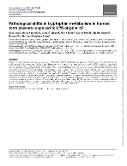Pathological shifts in tryptophan metabolism in human term placenta exposed to LPS or poly I:C

Author
Abad, Cilia
Karahoda, Rona
Orbisová, Anna
Publication date
2024Published in
Biology of ReproductionVolume / Issue
110 (4)ISBN / ISSN
ISSN: 0006-3363ISBN / ISSN
eISSN: 1529-7268Metadata
Show full item recordCollections
This publication has a published version with DOI 10.1093/biolre/ioad181
Abstract
Maternal immune activation during pregnancy is a risk factor for offspring neuropsychiatric disorders. Among the mechanistic pathways by which maternal inflammation can affect fetal brain development and programming, those involving tryptophan (TRP) metabolism have drawn attention because various TRP metabolites have neuroactive properties. This study evaluates the effect of bacterial (lipopolysaccharides/LPS) and viral (polyinosinic:polycytidylic acid/poly I:C) placental infection on TRP metabolism using an ex vivo model. Human placenta explants were exposed to LPS or poly I:C, and the release of TRP metabolites was analyzed together with the expression of related genes and proteins and the functional activity of key enzymes in TRP metabolism. The rate-limiting enzyme in the serotonin pathway, tryptophan hydroxylase, showed reduced expression and functional activity in explants exposed to LPS or poly I:C. Conversely, the rate-limiting enzyme in the kynurenine pathway, indoleamine dioxygenase, exhibited increased activity, gene, and protein expression, suggesting that placental infection mainly promotes TRP metabolism via the kynurenine (KYN) pathway. Furthermore, we observed that treatment with LPS or poly I:C increased activity in the kynurenine monooxygenase branch of the KYN pathway. We conclude that placental infection impairs TRP homeostasis, resulting in decreased production of serotonin and an imbalance in the ratio between quinolinic acid and kynurenic acid. This disrupted homeostasis may eventually expose the fetus to suboptimal/toxic levels of neuroactive molecules and impair fetal brain development.
Keywords
intrauterine infections, placenta, tryptophan metabolism, fetal brain development, programming
Permanent link
https://hdl.handle.net/20.500.14178/2419License
Full text of this result is licensed under: Creative Commons Uveďte původ 4.0 International







